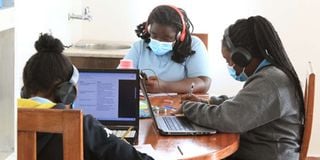Technology isn’t enough; let’s get soft skills as well

Students in a google class at Hampton Online School in Nanyuki on January 19, 2021. The school has tapped into online platform as a new way of learning hence avoiding the high cost of operating normal schools.
What you need to know:
- Many EdTech companies consider the pilot as the best direction towards making education accessible to all.
- At the onset of the Covid-19 pandemic in early 2020, many learning institutions switched to virtual classrooms.
The Teachers Service Commission (TSC) announcement of a pilot scheme to live-stream lessons to areas with teacher shortages elicited varied opinions by educationists, EdTech firms, tutors and parents.
Hybrid meetings, conferences and webinars are known to be nightmarish, given challenges ranging from bad connectivity to poor infrastructure and passive participation. It is almost impossible to assess the success of a session as not all participants have access to the device to chat, ask a question or do follow-up.
Many EdTech companies consider the pilot as the best direction towards making education accessible to all. However, the integration of technology into teaching and learning is not a new discourse. At the onset of the Covid-19 pandemic in early 2020, many learning institutions switched to virtual classrooms and even online graduation ceremonies.
But should all stakeholders move into tapping the advantages of technology in preparing the youths for the future of work?
Constantly evolving
While automation and innovation are the key drivers of the future of work, the workplace is constantly evolving. Success is in continually developing soft- and technical skills. Looking at the dynamics in educational institutions, emphasis is on developing technical skills as infusion of soft skills in a virtual environment is ineffectual.
Soft skills — like communications skills, teamwork, problem-solving, adaptability and creativity — are key in the future of the work labour market. An individual with these skills performs better and is innovative while adapting to change.
The infusion of soft skills in teaching and learning should be intentional, starting with teacher training and clear assessments rubrics for us to harnesses the low-hanging fruits.
Integration of technology can reduce costs and make education accessible to all but better systems that go beyond to develop a holistic learner who can fit and thrive in a workplace should be at the centre and deliberately implemented.
Mr Komba is a communication coordinator at Generation Kenya. [email protected]





